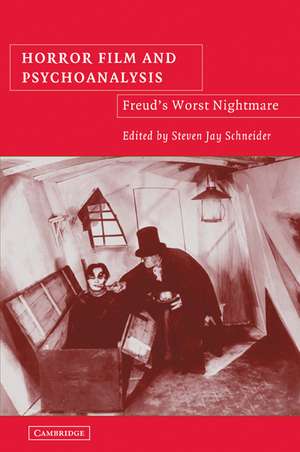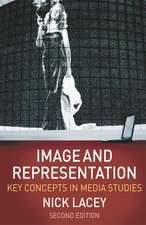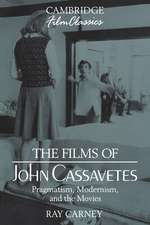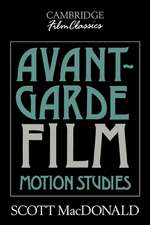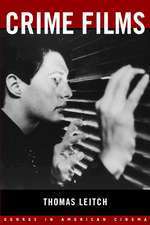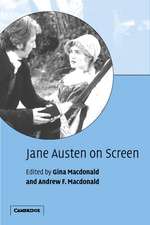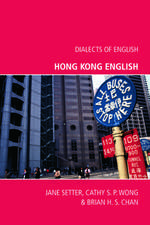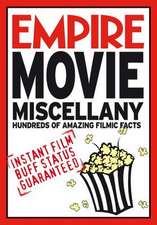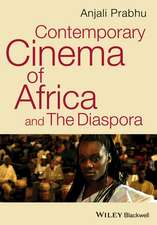Horror Film and Psychoanalysis: Freud's Worst Nightmare: Cambridge Studies in Film
Editat de Steven Jay Schneideren Limba Engleză Paperback – 28 ian 2009
| Toate formatele și edițiile | Preț | Express |
|---|---|---|
| Paperback (1) | 199.93 lei 3-5 săpt. | |
| Cambridge University Press – 28 ian 2009 | 199.93 lei 3-5 săpt. | |
| Hardback (1) | 696.12 lei 6-8 săpt. | |
| Cambridge University Press – 27 iun 2004 | 696.12 lei 6-8 săpt. |
Din seria Cambridge Studies in Film
-
 Preț: 157.13 lei
Preț: 157.13 lei -
 Preț: 305.62 lei
Preț: 305.62 lei -
 Preț: 450.15 lei
Preț: 450.15 lei -
 Preț: 283.03 lei
Preț: 283.03 lei -
 Preț: 293.93 lei
Preț: 293.93 lei -
 Preț: 283.79 lei
Preț: 283.79 lei -
 Preț: 279.29 lei
Preț: 279.29 lei -
 Preț: 180.92 lei
Preț: 180.92 lei -
 Preț: 273.72 lei
Preț: 273.72 lei -
 Preț: 399.98 lei
Preț: 399.98 lei -
 Preț: 279.98 lei
Preț: 279.98 lei -
 Preț: 179.38 lei
Preț: 179.38 lei -
 Preț: 284.29 lei
Preț: 284.29 lei -
 Preț: 205.41 lei
Preț: 205.41 lei -
 Preț: 311.71 lei
Preț: 311.71 lei -
 Preț: 257.32 lei
Preț: 257.32 lei -
 Preț: 174.38 lei
Preț: 174.38 lei -
 Preț: 280.53 lei
Preț: 280.53 lei -
 Preț: 282.87 lei
Preț: 282.87 lei
Preț: 199.93 lei
Nou
Puncte Express: 300
Preț estimativ în valută:
38.26€ • 40.05$ • 31.65£
38.26€ • 40.05$ • 31.65£
Carte disponibilă
Livrare economică 15-29 martie
Preluare comenzi: 021 569.72.76
Specificații
ISBN-13: 9780521107853
ISBN-10: 0521107857
Pagini: 320
Ilustrații: black & white illustrations
Dimensiuni: 152 x 229 x 18 mm
Greutate: 0.47 kg
Editura: Cambridge University Press
Colecția Cambridge University Press
Seria Cambridge Studies in Film
Locul publicării:New York, United States
ISBN-10: 0521107857
Pagini: 320
Ilustrații: black & white illustrations
Dimensiuni: 152 x 229 x 18 mm
Greutate: 0.47 kg
Editura: Cambridge University Press
Colecția Cambridge University Press
Seria Cambridge Studies in Film
Locul publicării:New York, United States
Cuprins
Preface: what lies beneath? Robin Wood; Introduction: Psychoanalysis in/and/of the horror film Steven Jay Schneider; Part I. The Question of Horror-Pleasure: 1. 'What's the matter with Melanie?': reflections on the merits of psychoanalytic approaches to modern horror cinema Cosimo Urbano; 2. A fun night out: horror and other pleasures of the cinema Michael Levine; 3. Excerpt from 'Why Horror? The New Pleasures of a Popular Genre' (with a new afterword by the author) Andrew Tudor; 4. Philosophical problems concerning the concept of pleasure for future psychoanalytical theories of (the horror) film Malcolm Turvey; Part II. Theorizing the Uncanny: 5. Explaining the uncanny in The Double Life of Véronique Cynthia Freeland; 6. Manifestations of the literary double in modern horror cinema Steven Jay Schneider; 7. Heimlich maneuvers: on a certain tendency of horror and speculative cinema Harvey Roy Greenberg; 8. 'It was a dark and stormy night …': horror films and the problem of irony Jonathan L. Crane; Part III. Representing Psychoanalysis: 9. 'What does Dr. Judd want?': transformation, transference and divided selves in Cat People William Paul; 10. 'Ultimate formlessness': cinema, horror, and the limits of meaning Michael Grant; 11. Freud's worst nightmare: dining with Dr Hannibal Lecter Barbara Creed; Part IV. New Directions: 12. Doing things with theory: from Freud's worst nightmares to (disciplinary) dreams of horror's cultural value Matt Hills; 13. The darker side of genius: the (horror) auteur meets Freud's theory Linda Badley; 14. Violence and psychophysiology in horror cinema Stephen Prince; Afterword: psychoanalysis and the horror film Noël Carroll.
Recenzii
Review of the hardback: 'Who can resist a volume which, apropos the most popular movie genre - horror, stages the debate between the main orientations of contemporary psychoanalytic film theory? And why should we resist a unique combination of top theory and fascinating topic? Everyone in cinema and cultural studies should just grab this collection, sit down and learn!' Slavoj Zizek , Ljubljana, University of Slovenia
Review of the hardback: 'This superb collection offers its readers a roller-coaster ride through contemporary film theory and the question of horror. Psychoanalysis is the central issue for many contributors, with essays exploring not only its place in relation to the Gothic Imagination at the heart of horror but also its consequent role in both forming and analysing the horror film. Sparks fly across the pages as the philosophical and epistemological premises of theories of horror are themselves subjected to analysis and evaluation as well as, in some cases, rejection. All the while the horror film, in all its gory glory, both uncanny and irrepressible, remains centre stage throughout the wide-ranging discussions and analyses of films from Nosferatu to Scream. The essays in The Horror Film and Psychoanalysis: Freud's Worst Nightmares are exemplary philosophical and aesthetic discussions, their complex and subtle arguments are both challenging and thought-provoking.' Elizabeth Cowie, University of Kent, Canterbury
Review of the hardback: 'This superb collection offers its readers a roller-coaster ride through contemporary film theory and the question of horror. Psychoanalysis is the central issue for many contributors, with essays exploring not only its place in relation to the Gothic Imagination at the heart of horror but also its consequent role in both forming and analysing the horror film. Sparks fly across the pages as the philosophical and epistemological premises of theories of horror are themselves subjected to analysis and evaluation as well as, in some cases, rejection. All the while the horror film, in all its gory glory, both uncanny and irrepressible, remains centre stage throughout the wide-ranging discussions and analyses of films from Nosferatu to Scream. The essays in The Horror Film and Psychoanalysis: Freud's Worst Nightmares are exemplary philosophical and aesthetic discussions, their complex and subtle arguments are both challenging and thought-provoking.' Elizabeth Cowie, University of Kent, Canterbury
Descriere
This volume explores the subject of psychoanalysis and film.
